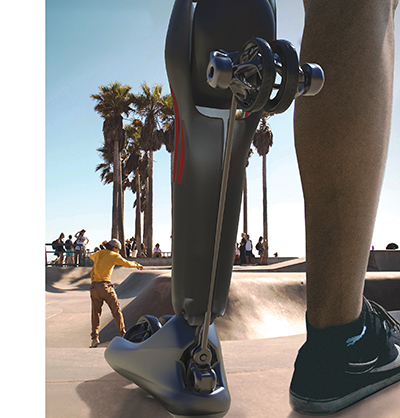The assignment in Drew Spahn’s industrial design course was to design a mobility device for people with disabilities, and he didn’t really know where to start. Then Spahn read about Mike Schultz, the motocross rider and Paralympic snowboarder who has won multiple high-level competitions using prosthetic equipment he built himself.

“I was wowed by that,” Spahn says. “He really took it into his own hands. I used that for inspiration.”
From that seed of an idea, Spahn went on to become a champion himself. His Crosswing, a prosthetic leg with an ingenious built-in skate feature, won first prize in last year’s Michelin Movin’On Challenge, an annual design contest that draws entries from all over the world.
“Skating is a common form of mobility that falls between walking and driving,” says Spahn, who graduated from Kean University last spring with an industrial design degree. “When I looked into it, I couldn’t find a skate device specifically for people who are missing a limb.”
His original concept was a roller-skate attachment that would pair with a standard prosthesis. But as he refined the idea, Spahn began leaning toward an all-in-one device that could be used both for walking and for skating.
“I really struggled with how to incorporate the function of the wheel into the prosthesis,” he explains. The breakthrough came when Spahn devised a folding mechanism. In the up position the wheels are inoperative, and the leg functions like a normal prosthesis. In the down position the wheels hit the pavement, enabling the user to roll along as if on a scooter or skateboard.
Since Michelin makes automobile tires, Spahn wasn’t sure if the judges would give full credence to his non-motorized innovation. But his idea perfectly fit the contest’s theme of inclusive mobility design for people with disabilities. So when he was informed he’d won the top prize, Spahn wasn’t completely shocked.
“I mean, of course I was thinking ‘This can’t be real life,’” he laughs. “But I knew my project could make a real impact for people, and when I looked back at past winners, those types of projects tended to do well.”
Because of the COVID pandemic, Spahn hasn’t been able to put the Crosswing through a full testing and prototyping process yet. But he’s looking for volunteers. If you’re interested in working with him on this project, send an email to editor@livingwithamplitude.com.
Share Your Hacks, Rake in Cash
If you’re an inveterate tinkerer (and what amputee isn’t?), there’s finally a way to get rewarded for your ingenious life hacks. The Simply Open Awards will be handing out £25,000 (about $33,000) to people with disabilities who’ve devised simple, affordable adaptations that improve quality of life and lower barriers to inclusion. You can win up to £2,000 in each of five categories (Daily Living, Employment, Social Mobility, Communication, and Education), with the chance to win an all-expenses trip to Vienna next spring to present your idea at the Zero Project Conference.
The contest opens on May 19. To enter, record a two-minute video demonstrating your idea, then upload it to the contest website at simplyopen.io/awards. You can submit your entries through September 2. The winners will be announced on December 2.




